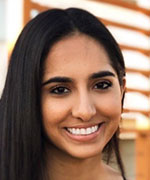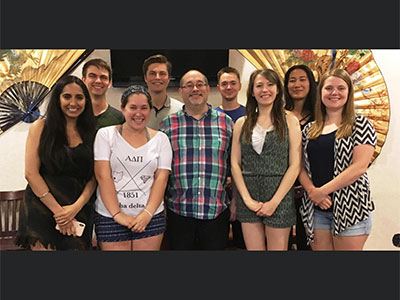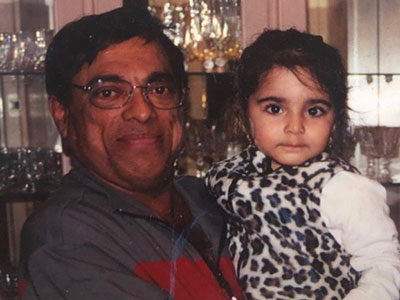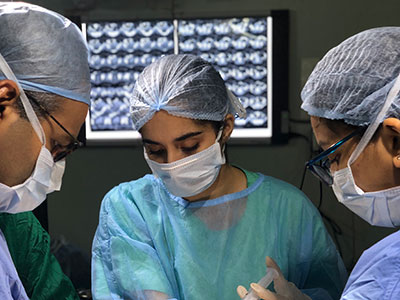
- senior honors major in Microbiology, with a Premedical Studies co-major
- minor in Rhetoric and Writing
- from Columbus, OH
- Honors Program mentor
- studies mycoplasmas bacteria in Mitch Balish's microbiology lab
- shadowed a surgical oncologist in India (Summer 2019)
- founded a nonprofit organization, Aapar Foundation, to provide medical supplies to India
"Definitely take advantage of Miami's small- or mid-sized campus atmosphere. There are a lot of openings for internships as well as so many clubs that you can join. There are also a lot of scholarships and faculty research projects you can be involved in that will help you stay focused. The professors and advisors here at Miami do a good job of keeping you on track and helping you graduate within four years."
Why Miami?
"At the end of my senior year of high school, I knew that I wanted to pursue my dream of becoming a doctor. And, being from Columbus, I was told by my peers that Miami University had a great pre-med program, and it was one of the only universities in the Midwest that offered microbiology as a major.
"Hearing this, I had the feeling that my pathway to success would be enhanced by majoring in microbiology and having a pre-med co-major. And, it would be great to be close to home. After exploring Miami further, I quickly learned that the microbiology faculty were easily accessible, and the classroom sizes were not as large as those at state schools. This gave me confidence that it would be easy to find a research project that catered to my interests."
Best Miami Experiences

The Balish Mycoplasmology Lab (with Esha Chadha on the far left)
"The transition from high school to college is often overwhelming, but eventually you learn how to adjust. Within my first semester I got the hang of things, such as how to study for these classes and how to be a competitive applicant for med school. So, I always put my hardest efforts into all my classes from the beginning.
"I also started looking for a research project in microbiology by visiting websites and contacting several professors after my first semester, and was able to get a research position in professor of microbiology Mitch Balish's lab by my second semester freshman year. He's been my mentor ever since! It's great to have worked with him from the beginning, because he's been guiding me and giving me advice. A lot of my success that I've had here is due to him. Dr. Balish helped me realize how important research is, so I definitely see myself pursuing research even when I'm in medical school.
"In Dr. Balish's lab we work a lot with bacteria called mycoplasmas. Last year, of course before the pandemic, we did a super cool experiment in which we isolated the bacteria from the urine of actual patients. That experience has had a huge impact on me because I've been able to go in-depth about one specific strain of bacteria and gotten a solid grasp on my education. I know that if I wish to continue doing research in the future I can do it — because I've been doing it for the past 3½ years!
"Another professor who has helped me is assistant professor of microbiology Tim Wilson. Through his immunology course, Dr. Wilson has been keeping us very much up to date with the latest information, such as with Covid-19. There's a lot of overlap between pre-med and microbiology, and it is one of my favorite courses in the microbiology major because it is so medically relevant!
"After my sophomore year, in 2019, I went to India for two months during the summer to work with a surgical oncologist. While I was there we worked with patients that lived below the poverty line. This experience inspired me to establish my own nonprofit organization, Aapar Foundation. I graduate this December, and I'll then take a year off to work on my organization.
"I am also an honors mentor in Miami's Honors Program. We mentor students that also have STEM majors and help guide them on what to do. This is a good experience, because I know that when I was a freshman I was nervous when meeting people, and it was nice to have a mentor that I could text and be like 'Hey, what classes should I take?' Or I could even ask more general questions like where is the library or dining hall? Of course, Miami already does a good job of making people feel like they are where they're supposed to be."
Miami and the Liberal Arts

Esha Chadha with her father
"When I was five, my dad passed away from cancer. He was a physician, and even after getting chemotherapy radiation he would go to work so he could be there for his patients no matter what. So I knew that I wanted to be a doctor because I wanted to make an impact on lives like he did. Coming to Miami, I realized that this is my purpose.
"However, I didn't fully realize I wanted to become a surgeon and help cancer patients until I went to India. After that trip I realized that I really love the medical environment and a career that's hands-on and requires quick problem-solving.
"And it's hard! My microbiology major is pretty difficult and challenging, and there have been a lot of nights, a lot of Friday and Saturday nights even, that I was in King Library, or did not talk to anyone, just because I'm working on myself and my major. It has helped me to understand a lot of different medical issues, such as pathogenesis, immunology, vaccines, and a lot more. I've also learned a lot about problem-solving and troubleshooting. Together with my pre-medical co-major, I've been taking all of the required courses that I need for medical school, so I didn't have to worry about meeting the requirements.
"Microbiology is definitely challenging and detail-oriented, but it's fascinating to learn about properties of microorganisms like bacteria, fungi, viruses, and then applying that knowledge. And I also love identifying unknown microbes, emerging diseases, and disease transmission, all in medical diagnostic laboratory settings. I picked microbiology over a biology degree because I'm very curious about the minute details, and again, there's a lot of overlap in the classes that you would need for med school.
"On top of that, my Rhetoric and Writing minor is great. I've established a website for Aapar Foundation to share everything that's going on, and we've learned things about content strategy, which covers what kind of things do people, as viewers, want to see on a website, or what is most likely going to draw them to donate. Once we have patients that we start raising funds for, I can write up stories about them and create a crowd-funding platform. This minor has given me that marketing and creative side to help in the promotion of my organization."
Providing Medical Supplies for Cancer Patients in India

Esha Chadha working on a cadaver in India
"When I worked with a surgical oncologist in India, a lot of our patients were from the slums and had extensive disease symptoms. A lot of them could not afford the basic necessities for cancer treatment, like chemotherapy ports and peripherally inserted central catheter (PICC) lines. So, they had to get their chemotherapy through their veins, which can sometimes cause your arms and legs to stop functioning.
"Many of these patients would rather die than have nonfunctioning hands or legs. It was something that we would probably never see here in the United States, having to choose whether to get treated for cancer or have these nonfunctioning limbs. So after I returned home I shadowed an oncologist here to see the differences between how cancer patients in India and the United States are generally treated. The doctor I was working with told me that we have a big surplus of chemotherapy ports and PICC lines, which are often thrown away and wasted.
"I decided that perhaps I could somehow find a way to send these supplies to the doctor I knew in India so that those patients could get proper treatment. So I started the Aapar Foundation as a nonprofit organization and received tax exemption. Basically right now we're working on a project with a medical device manufacturer, and we're planning to send over 150 PICC lines to India in November.
"I'll be working for a year with my NPO after I graduate, and then after that, I'm going to apply to med school."
Advice to Students
"Definitely take advantage of Miami's small- or mid-sized campus atmosphere. There are a lot of openings for internships as well as so many clubs that you can join. There are also a lot of scholarships and faculty research projects you can be involved in that will help you stay focused. The professors and advisors here at Miami do a good job of keeping you on track and helping you graduate within four years.
"You should always ask questions. I loved going to office hours and bugging my professors — office hours are great especially for microbiology because you can get a lot of information at once. This has always helped me in the end. And definitely find a research project as well as a mentor that can help you."
[October 2020]
 Miami University Oxford, Ohio est. 1809
College of Arts and Science
Miami University Oxford, Ohio est. 1809
College of Arts and Science
 Miami University Oxford, Ohio est. 1809
College of Arts and Science
Miami University Oxford, Ohio est. 1809
College of Arts and Science